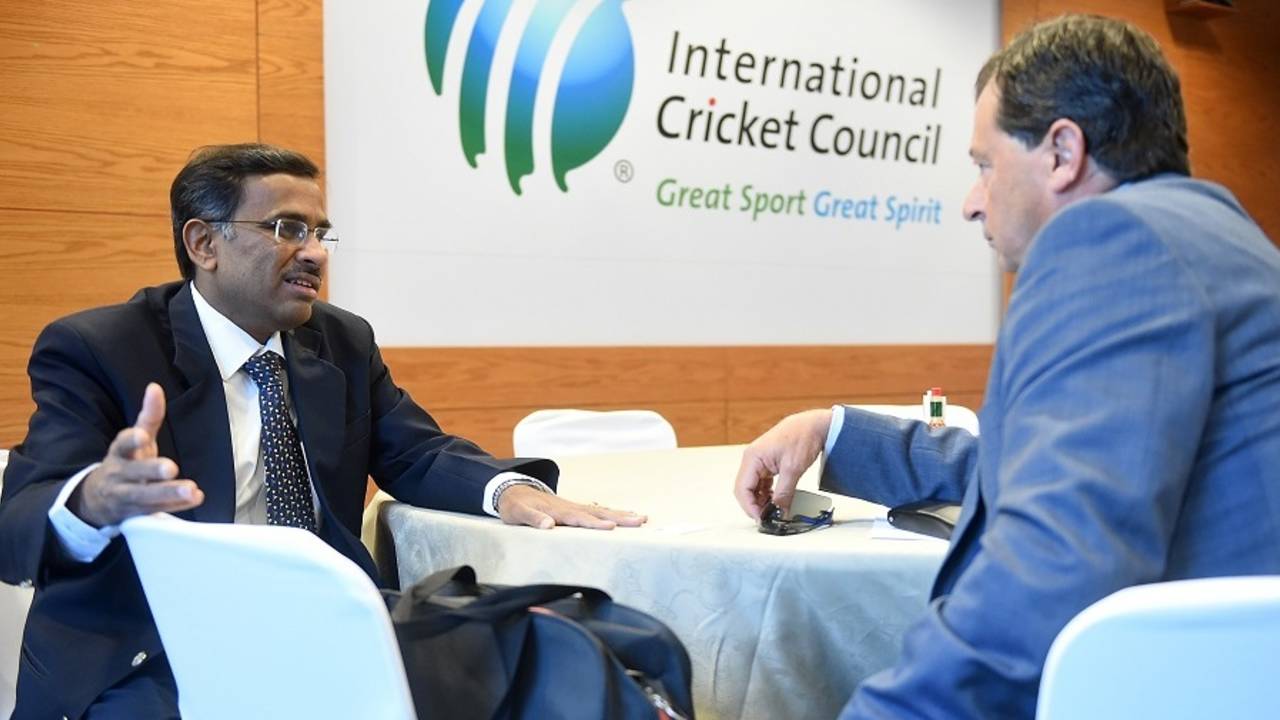Want to balance own interests with game's development, says BCCI
The BCCI has struck a measured and conciliatory tone on how it is likely to approach the matter of the proposed new ICC constitution in future
ESPNcricinfo staff
23-Mar-2017
Vikram Limaye, a member of the BCCI's CoA, had said at the ICC's February meeting that there was no formula to the proposed revenue distribution model • Getty Images
Days after sending a detailed response to the ICC about its concerns on the proposed new constitution, the BCCI has struck a measured and conciliatory tone on how it is likely to approach future discussions on the matter. Speaking to media on Wednesday, the Committee of Administrators (CoA) currently running the Indian board stressed that it wanted to balance its own interests with the need to develop the game globally. In light of the difficult relationship the game's governing body has had with its most powerful constituent over the last decade, this message amounts to a distinct change in tone from the BCCI.
Alongside Sri Lanka Cricket (SLC), the Indian board was a notable objector to the draft constitution, passed in principle by seven Full Members at an ICC Board meeting in February. The key disagreement is over a substantial reduction in the BCCI's revenues from ICC events from the previous financial model, but, as the BCCI's email earlier this week detailed, there are other areas of concern, including over membership and the role of the ICC chairman.
"There's a fine balance between being democratic, getting enough revenues, what we deserve, and at the same time contributing to world cricket," Vinod Rai, the CoA chairman, said in Delhi. "We will get what we deserve, but it's a decision we will take to contribute to help other nations at a lesser level as far as cricket is concerned."
According to Rai, it was the responsibility of bigger member countries like India to contribute to the growth of Associates like Afghanistan and Ireland - the new constitution envisages both countries graduating to play Test cricket and has earmarked a portion of ICC revenues for each. But that will not be done at the expense of divesting the BCCI's financial interests. "We'll contribute to upgrading cricket skills in those nations. I'm not getting into specifics. The issues are two-fold. You spoke of democracy and revenues. We have to bring about a balance. You can't sacrifice your interests to help someone else."
Although the response to the ICC was signed by Rahul Johri, BCCI's chief executive officer, it had been prepared in consultation with the four-member CoA. The response backed the stance first taken by Vikram Limaye, a member of the CoA, and the BCCI representative at the ICC's February meeting: Limaye had argued that there was no formula underpinning the ICC revenues set to be earned by the member countries.
The CoA had conveyed more or less the same message to Shashank Manohar, the former ICC chairman who stepped down from his position abruptly last week. The day before resigning, Manohar had met Rai, Johri and Limaye in Mumbai. "When we met with Manohar, we tried to understand the logic behind the financial model," Rai said. "We were new to it. We discussed with people inside BCCI who were privy to these meetings earlier. We tried to understand from him because he has seen from both the BCCI and the ICC point of view. Whatever he could explain to us, we understood. We put forward our position and he was appreciative of it."
The CoA made it clear to Manohar that the board would not step back from its objections, but Rai said this should not be misinterpreted defiance. "We don't want to be confrontationist. Certainly not. We had a very good [meeting]. We have our reservations on it. We have to put forward our interests. We just explained our concerns."
Stonewalling, confrontation and other pressure tactics have often been used by past BCCI administrations at the ICC. And though the CoA has made clear its approach will be different, Rai did warn that if other Full Members wanted to play politics, the BCCI would not hold back. "Interests of BCCI will be protected totally. We are not interested in playing politics, but if politics needs to be played we won't be found wanting."
